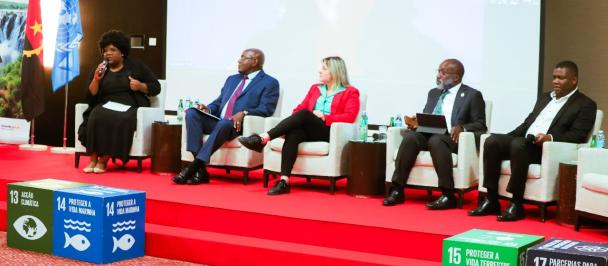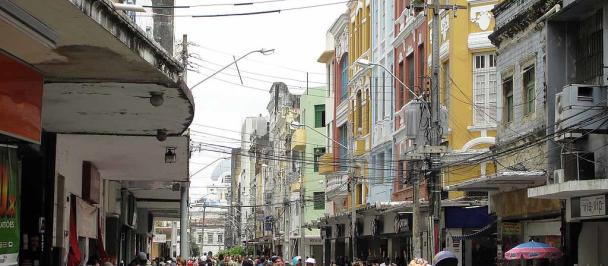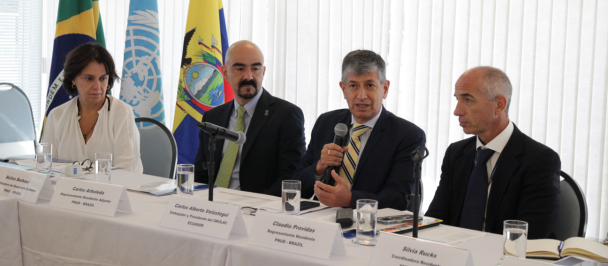São Tomé and Principe’s Path to Prosperity: Unleashing Potential through the SDGs
10 de October de 2023

“Now is the time for a global plan to rescue the Sustainable Development Goals” stated the UN Secretary General as the entire global community gathered in New York for the Sustainable Development Goals (SDGs) summit convened by the United Nations last week to assess the progress made towards the 2030 Agenda. 2023 marks a pivotal year, with just seven years remaining to achieve what the UNSG calls “….not just a list of goals.. as they carry the hopes, dreams, rights and expectations of people everywhere”.
At a time when the world grapples with multitude challenges, the latest Global Sustainable Development Report (GSDR) 2023 paints a stark picture: only 12 percent of the SDG targets are on a positive trajectory, while half of them are lagging behind. Even more concerning is that progress on over 30 percent of the SDGs has either stagnated or regressed. The COVID-19 pandemic, coupled with climate change, biodiversity loss and pollution crises have dealt a severe blow to the SDGs. This challenging context has been further compounded by the global implications of the ongoing conflict in Ukraine.
The SDG Summit and a series of other significant high-level meetings had the objective to breathe new life into the 2030 Agenda and advocating for the transformative measures required to fulfill the SDGs. The SDG Summit on September 18 and 19 was the centerpiece of these gatherings and provided a momentous occasion for global leaders to reaffirm their dedication to the SDGs and discuss strategies for their realization. The summit culminated with global leaders displaying unity by adopting a political declaration to reaffirm their strong commitment to the SDGs.
Subsequent to the SDG Summit, the spotlight shifted to the Climate Ambition Summit on September 20th, underlining the urgency of addressing climate change within the framework of sustainable development. Simultaneously, September 20th witnessed the convening of the High-Level Dialogue on Financing for Development, a critical component in the quest to secure resources for SDG implementation. It is important to note that critical discussions on these closely intertwined dimensions will continue in the months to come.
The issue of financing poses a significant challenge, particularly for LDCs and lower-middle-income nations like São Tomé and Príncipe (STP). Addressing this challenge necessitates the establishment of a new financial framework that prioritizes effective investments in achieving the SDGs. Therefore, it is paramount that we unite in support of the United Nations Secretary-General's SDG stimulus plan, which aims to bridge the financing gap for the SDGs.
Simultaneously, we must acknowledge that propelling the global economy toward inclusivity, resilience, and a net-zero emissions trajectory, as mandated by the SDGs, hinges on our ability to expedite progress within the Paris Agreement on climate change. It is crucial to act swiftly as the consequences of climate change disproportionately affect the poorest and most vulnerable populations.
The issue of financing poses a significant challenge, particularly for LDCs and lower-middle-income nations like São Tomé and Príncipe (STP). Addressing this challenge necessitates the establishment of a new financial framework that prioritizes effective investments in achieving the SDGs. Therefore, it is paramount that we unite in support of the United Nations Secretary-General's SDG stimulus plan, which aims to bridge the financing gap for the SDGs.
In just two months, the COP28 in Dubai will serve as a pivotal moment for the international community to assess its advancements since the adoption of the Paris Agreement in 2015. Given the considerable divergence from our intended course, decisive climate action is imperative to make substantial headway toward achieving the SDGs.
Immediate action is therefore needed at all levels – local, national and global. We must act as individuals and as a united global community. Failure to do so risks compromising the 2030 Agenda, which promises a more sustainable, equitable and prosperous world, becoming a symbol of missed opportunities.
For a Small Island Developing State (SIDS) like São Tomé and Príncipe (STP), the recent multiple crises have taken a disproportionately severe toll. Heavily reliant on external markets for imports, exports, and financing, and operating within a very fragile environmental and biodiversity context, STP is highly exposed to external shocks. Furthermore, these shocks have a particularly harsh impact on the impoverished and the most marginalized segments of the population, who are ill-equipped to withstand their repercussions.
In 2022, STP achieved a significant milestone by preparing its first National Voluntary Report, comprehensively evaluating its progress toward the SDGs. This report was presented during the High-Level Political Dialogue in New York. Despite incredible challenges, STP has made remarkable strides in healthcare, education and access to clean water among others, elevating its human development status and positioning the country for potential graduation from Least Developed Country (LDC) status by the end of next year. Nevertheless, significant hurdles remain, particularly in areas such as governance, justice reform, poverty reduction and inequality. The recent surge in migration to Portugal, triggered by the new legislation introduced by the Government of Portugal to operationalize the mobility agreement within the Comunidade dos Países de Língua Portuguesa (CPLP), is indicative of growing dissatisfaction among a predominantly young population (61% of the population are in the under-25 age group – UN Common Country Analysis 2022) seeking employment opportunities elsewhere, with potential challenges and opportunities which need to be analyzed carefully.
Today, STP stands at a pivotal juncture where it must harness its inherent potential to foster prosperity and sustainable development. With a youthful population, unspoiled natural beauty, rich biodiversity, unique agricultural offerings and a profound historical and cultural heritage, the nation possesses invaluable resources waiting to be fully utilized for economic transformation and social progress. In a compelling manner, the SDG agenda offers a holistic framework for accomplishing sustainable economic growth, fostering job creation, and effectively reducing poverty, all within the guiding principle of ensuring that no one is left behind. Therefore, it is imperative that all stakeholders, both state and non-state, intensify their commitment to these goals and address the pressing challenges that threaten our shared future. In particular, strong partnerships with youth including the most marginalized, are essential.
São Tomé and Príncipe's recent assumption of the CPLP presidency for the 2023-2025 two-year term, under the theme "Youth and Sustainability," and launched during the CPLP summit held in São Tomé in August of this year, presents a remarkable opportunity to harness the potential of youth for sustainable development. The summit declaration strongly underscores the significance of strengthening collaboration in public policies for youth and promoting dialogues aimed at advancing the achievement of the SDGs. We cannot afford to miss out on this extraordinary opportunity.
As the UN' development agency, the United Nations Development Programme (UNDP) is deeply committed to championing the SDGs, both on a global scale and within STP. UNDP is tirelessly engaged on the ground in 170 countries and territories to ensure meaningful progress across all 17 of the SDGs, especially on critical issues like poverty, health, gender equality, sustainable energy, employment, and biodiversity.
Here is STP, through extensive consultations with national stakeholders, the UNDP has crafted a strategic roadmap for the period 2023- 2027, aligning its efforts, mandate and capacity with the Government's top priorities and the most critical needs of the nation. This ambitious endeavor that was discussed and approved by our Executive Board in January of this year, encompasses four major areas of focus:
1. Empowering Economic Growth:
Under this critical area, UNDP's mission drives to expand employment opportunities and foster income generation, with a particular emphasis on economically empowering women, youth, and marginalized communities. The goal is to reduce poverty and inequalities while promoting social cohesion. Notably, the nature of a small island state requires that this endeavor must be intricately linked with an environmentally friendly economic model aligned to STP's rich biodiversity and that preserves its natural heritage. Our enduring commitment to supporting entrepreneurs and national value chains, both formal and informal, with a particular focus on women, and our contributions to the revitalization of business incubators in both the capital São Tomé (REINA) and on the island of Príncipe are indicative of our commitment to support this field of work.
2. Climate Resilience and Renewable Energy:
Recognizing the urgent need to shield the nation from the impacts of climate change, the UNDP's second and interlinked priority is to support adaptive and mitigative measures. By building capacity to adapt and recover swiftly from extreme weather events, we aim to enhance the resilience and safety of the population. Additionally, the program envisions an accelerated shift toward sustainable, renewable energy sources to reduce the country's carbon emissions and increase energy resilience. A significant milestone in this direction was the recent inauguration of STP's first solar power plant in Santo Amaro, supported by UNDP jointly with the AFDB, with new collaboration in this sector expected also with the WB and other partners, including the private sector. In the near future, we will initiate new energy-related projects, including the establishment of mini-grids and the implementation of measures to greening healthcare and education facilities. These endeavors will play an important role in advancing the country's energy transition, bolstering resilience and promoting sustainability.
3. Ensuring Access to Quality Social Services:
UNDP is working collaboratively with other United Nations agencies to ensure that all citizens, particularly the most vulnerable, have equitable access to quality social services such as healthcare and social protection. Leveraging technology and digitalization, UNDP aims to enhance transparency, efficiency and equity in service delivery, ultimately improving the quality and quantity of social services available to the people of STP. As an example, since 2021, UNDP has assisted the government in digitizing the healthcare supply chain through a Logistics Management Information System (LMIS). This system manages medicines from procurement to distribution, including forecasting and warehousing. It covers major hospitals and 39 healthcare facilities, aiming to save costs and ensure a steady supply of medications. Similar efforts are underway to digitalize the Health Information System to improve patient care and to link it to social protection databases in view of facilitating access to services for vulnerable populations
4. Strengthening Governance and Accountability:
In its commitment to fostering good governance, UNDP will continue to actively engage with, and support, public institutions as key enablers for the achievement of the SDGs. This support extends to enhancing transparency, responsiveness, gender sensitivity and accountability. Critical areas of focus include the reform of the justice sector, modernization of public administration, improvements in public planning, financing, and spending, as well as fostering greater participation and inclusivity in the political decision-making process. As an example, through the UNDP-supported Justice System Modernization Program, a national Data Center has been established that will centralize data generated by various government applications, enhancing procedural efficiency, transparency, and accountability. Additionally, the creation of 500 institutional e-mail accounts using the gov.st domain has enhanced communication security within public institutions. Also, the forthcoming introduction of the Case Management System in Criminal Procedure is expected to reduce pending cases, enhance process speed, transparency, efficiency, and accessibility to information. This system aligns with government programs and UNDP's goals which are to make the justice system more credible and citizen-oriented
The success of these initiatives hinges on concerted efforts among different government and non-governmental partners, our sisters UN agencies, and effective public leadership.
UNDP’s newly approved programme for STP underscores its dedication to partnering with all partners in realizing the SDGs by 2030. We believe it is time to move from hope into action as there are stories all over that show what is possible when people come together and demonstrate profound commitment and courage to change.
As Sao Tome and Principe moves forward on its efforts on this transformative journey, UNDP remains a steadfast ally, working hand in hand with all stakeholders to build a brighter and more sustainable future for the country.

 Locations
Locations



